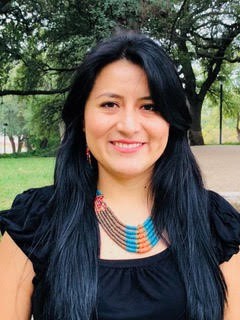Indigenous Learning Forum: "Indigenous Countertopography of Femicide: Witnessing the Modern Gender Genocide" with Alexandra Lamiña

The first 2023-2024 Indigenous Learning Forum will take place November 2, 2023 at 3:00 p.m. ET on Zoom.
The speaker will be Alexandra Lamiña. Alexandra is a KItu-Kara doctoral candidate in Latin American Studies at the University of Texas at Austin, where she also pursued a dual master's degree in Community and Regional Planning (MSc) & Latin American studies (MA). Her academic background is in Geography, Urban Planning and Environmental Studies, and her previous work focused on Indigenous geographies and regional planning in Ecuadorian Amazonia. Working in the Indigenous Amazonia with the Kichwa Nation has inspired her work to support territoriality and political representation processes since 2010. She has also participated in international collaborations for Geographical Assessments in Indigenous and Afro-Latin descent Politics of Territorial Rights and Autonomy in Bolivia, Colombia, and Brazil and planning studios in informal areas of the Dominican Republic and Mexico. Her dissertation examines how Indigenous people in Ecuadorian Amazonia transform settler colonial urbanization through Indigenous knowledge co-production, gendered mobilities, and Indigenous Planning. She mainly focuses on the Amazonian urban geographies learning from Indigenous epistemological traditions and drawing on feminist, Indigenous, and decolonial thinking in geography and urban planning. Her study also includes training and knowledge co-production with Indigenous women in geospatial research and feminist Indigenous geographies to connect diverse epistemological perspectives from Global South-North research with urban development practice.
The Library & Museum's Indigenous Learning Forum (formerly the Indigenous Studies Seminar Series) is a space for sharing Indigenous-led and community-engaged projects, as well as research in Native American and Indigenous Studies and related fields. Questions about the series may be directed to Ruth Rouvier, NASI Engagement Coordinator, at [email protected].
NOTE: These programs are designed as spaces for sharing ideas and works still in-progress. For this reason, this event will not be recorded. This event is open to all but registration is required.
Community-engaged research approach: My work builds on my decade-long work and research experience as a geographer, urban planner, and environmental specialist in Ecuadorian Amazonia. Currently, I serve as a community researcher for various Kichwa women-run organizations in Ecuadorian Central Amazonia. We are collaborating to study the Amazonian urban process and Indigenous gendered mobilities from Indigenous standpoints.
This paper is situated in the field of Indigenous Planning, intersecting Geography and Gender studies to reveal how the colonial binary-centrism norms femicide undermining women’s lives and our existence rights as sociopolitical actors in Ecuador. I engage with a situated Abya-Yala Indigenous Feminism drawing on Ecuadorian Kichwa Dolores Cacuango’s contributions on colonial-gendered violence and Bolivian Aymara Silvia Cusicanqui’s notion of decolonial gaze to rebuild a systematic history of violence and brutality against Indigenous and non-Indigenous women. I also suggest that Cindi Katz’s counter-topographical thinking provides a fruitful way of questioning past/present and ongoing settler-colonial powers intervening in the state’s role in granting justice and avoiding violence against women. I thus question the femicide topography in Ecuador remapping a historically situated topography. Through Cacuango’s life experience resisting the colonial Hacienda system, I draw attention to the colonial structural powers and cross-scale interactions that endure violence against women, which are hidden behind the simplified picture of femicide – killings of women by men. My collaborative work in Indigenous Planning with Indigenous women in Ecuadorian Amazonia offers an avenue to struggle against violence by strengthening community-based practices in art, culture, and economic initiatives.
